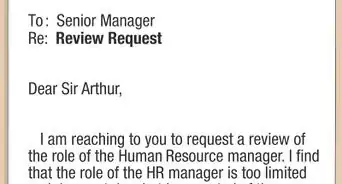X
wikiHow is a “wiki,” similar to Wikipedia, which means that many of our articles are co-written by multiple authors. To create this article, 14 people, some anonymous, worked to edit and improve it over time.
There are 7 references cited in this article, which can be found at the bottom of the page.
This article has been viewed 30,074 times.
Learn more...
Acting weirdly at work can... weird out your coworkers. Part of the problem though, is to know when behavior is considered weird by the standards of others around you. This may not always be evident, or you might just not care, but since you're reading this it's assumed you care enough to want to avoid the weirdness at least some of the time.
Steps
Part 1
Part 1 of 2:
What's weird at work?
-
1Define what's weird. This will vary depending on who you are and mostly on how others around you perceive weirdness. Remember that every workplace is different and the context matters a great deal as to whether or not any behavior and action is considered weird. In the workplace, weirdness might incorporate one or any combination of the following:[1]
- Dressing in bright colors, or provocatively, or dowdily, or over-the-top, or too casually.
- Decorating your work space with too much personal stuff, such as many baby or pet photos, hanging up handcrafted items you made at home, hanging punk rock posters everywhere, turning the cubicle into a shrine, etc.
- Talking too loudly all the time, wanting to tell jokes to coworkers all day long, winking at people, interrupting people on a deadline to tell them long-winded stories, etc.
- Bringing stinky lunches to work and heating them up in the workplace kitchen, then eating at your desk while others are still trying to work.
- Bringing your pet to work when it's not Bring Your Pet to Work Day.
- Insisting on leaving your bicycle in your cubicle when the workplace has a bike holding area downstairs.
- Refusing to join the others for workplace morning or afternoon teas, Christmas parties, etc.
- Refusing to contribute to whip around fundraising for workplace events and coworker's personal events (such as births, retirement, leaving, etc.).
- Coming into work obviously sick. Not only weird but very unfair to others who might catch it.
- Deliberately staying later than everyone else even though you're not actually doing anything productive.
- Dancing at work
- Throwing objects at work
- Using work communications apps and sites to sell things for your side business
- Using work communications apps and sites to promote your YouTube channel
- Making funny videos in the workplace
- Doing impressions of Elmo or other characters(especially when dealing with customers)
- Bringing personal items with bizarre or unseemly images displayed to the public on them (phone cases, t-shirts, tote bags, water bottles, etc...). Note that certain things that you don't intend to be on display- such as the lock screen of your phone or the interior of the book you are reading- can still be visible to your co-workers should you use these personal items at work, and therefore caution should be exercised when choosing what books to read or what wallpaper to use.
- Asking people weird questions while they are trying to talk to customers or focus on some other similarly engaging task.
- The golden rule: Just because you think something is awesome does NOT mean your coworkers feel the same.
- Insert your own definitions, conceptualizations and ideas [here].
-
2Realize that this isn't about you exactly. It's about workplace harmony, conformity and smooth running. Anything different, anything that disturbs the status quo, can threaten to upend tradition and habit, which hold the systems and standards together so that people don't have to keep thinking too hard about the tasks being performed. This doesn't mean your coworkers aren't thinking––they sure are––it just means that the systems already in place tend to be things your coworkers are wed to, and find easier to keep using than to have disrupted. They know their jobs well, inside out even, and if they feel that weird behavior might slow them down or hold them up, it is going to be trying for them.[2]
Advertisement
Part 2
Part 2 of 2:
Avoiding weirdness at your workplace
-
1Consider your workplace. Some workplaces actively encourage you to "be yourself", weirdness and all. That's because those workplaces value the quirky and are probably very creative and liberal spaces to be in.[3] On the other hand, the majority of workplaces are not quite so liberal and many are downright conservative by nature and expect employees to toe the line. This includes wearing conservative or toned-down clothing, avoiding too much in the way of personalizing your work space and not challenging existing systems. If this is your style of workplace, acting weirdly can cause you to seem like a bad fit, and may harm your promotion prospects or even cost you your job.
-
2Gauge the tone of coworkers around you. Do they like a good laugh now and then or are they always heads down and completely focused on the tasks they're responsible for? Your first hint that acting weirdly is out of place is to see how coworkers react when you behave in certain ways. Pick up the cues from their initial reactions and decide not to repeat that behavior again while at work.
- Notice when coworkers seem impatient, annoyed, barely tolerating the behavior or ignoring you. If they roll their eyes, they're irritated.
- Be attentive when a coworker speaks frankly about the behavior to you.
- Be alert to coworkers' eyes glazing over when you talk to them about Mittens The Kitten for the forty-eighth time this week.
- Pick up on the annoyance in the emails sent to you about continuously forwarding jokes to your coworkers and stop.
-
3Tone down your wardrobe. Sure, you may love the bright colors, the flirtatious curves, the no-tie look or the leopard prints but if they're not the best fit for your workplace, they will get you labeled as "weird". Notice what your coworkers are wearing––that sets the scene for everyone else. Fall into line. You can wear your fun clothes outside of work.
- This doesn't mean complete conformity. If everyone is wearing a black suit, you can still wear a bright tie or scarf to enliven it.
-
4Do not be yourself if being yourself means being "weird" in the eyes of others. One of the least helpful pieces of advice is to "be yourself", no matter the occasion. This has resulted in the downfall of many an anti-authority respecting, deeply creative or gleefully bright person who fully believes that one must be true to oneself no matter the occasion. The problem with this attitude is that there are plenty of places where it's just better to be what is expected of you than to let your real self hang out in style. A conservative or run-of-the-mill workplace is where it is better to just act professionally and put on your brave mask. You can be yourself everywhere else but when your income depends on it, be what you need to be to get that money banked. Remind yourself that it's all for the cause of being yourself outside of hours.
- Dial your eccentricities down a notch and keep relationships with co-workers formal. This, of course, need not apply to relationships with other weird office workers. However, keep those interactions for break time, not during work time.
- Do not joke about sensitive or crude topics at work. Even if you think it's hilarious, at least one coworker is bound to be scandalized or offended. Furthermore, some jokes of a certain nature could be construed as harassment, and, like Draco Malfoy's father, the human resources department *will* hear about this.
-
5Tone down the desk environment. Bringing your own tent into the office for nap time is usually frowned upon. Posters of death metal bands are similarly disapproved of. Creating an homage to your family and pets by covering the cubicle walls top to bottom with photos is considered unusual. Staplers, paper, pens, and a laptop are more acceptable in this area.[4]
-
6Catch yourself whenever you're daydreaming or staring out of the window. While advertising agencies and Silicon Valley start-ups might actively value the thinker who stares off into space, most workplaces prefer to see you with your head down, scribbling, typing, rearranging, reformatting, phoning, emailing, being actively swamped in work action. Most offices do not allot time for daydreaming, ceiling staring and make believe. Keep this for evenings and weekends outside of the office.
-
7Keep your more unusual traits, abilities and habits to yourself. Your friends get it, your family has already embraced it. But your coworkers? They're another tale altogether and may just find this one oddity too far and could be compelled to use it to your disadvantage. If you are lucky enough to have some freak of nature ability, it is probably best if you don't share it with everyone at your staff meeting. Especially if your boss is one of the normal ones.[5]
-
8Avoid trying to turn the workplace into school. As much as the endless routine, the Prussian strictness and the unending deadlines suggest school to you, the pranking, skiving off and truancy parts of school are definitely not part of the workplace.[6] Moreover, your normal coworkers do not want to, and may never want to, make up a secret language with you. There are websites and out-of-workplace friends for that.
- Avoid stirring up rebellion––your coworkers first thought is always their mortgage, their car, then the school fees. Change is for the change agents and is something to be introduced with care and over time. If you stir the pot too much, you might find yourself being closely watched as a troublemaker.
-
9Come to work having taken care of your hygiene. Coworkers deserve cleanliness from one another. As the school kids say, "wear deodorant". And do your personal hygiene things at home or in the bathroom at work. After all, nobody wants to watch you clip your toenails at work.[7]
-
10Make plans to make your own change. If this has all seemed a bit much, perhaps a tad facetious, realize that few workplaces encourage personal expression. This is why people start their own businesses, become entrepreneurs or hunt down the workplaces that foster and celebrate creativity, uniqueness and any shade of "weirdness". If you feel that your workplace is truly stifling the person you'd rather be between 9 to 5 and any other hour you've dedicated to work, then maybe it's time to find an alternative route and to find that place that lets you truly be... yourself.[8]
Advertisement
Warnings
- Being a "bad fit" in a workplace often the beginning of a dismissal process. An inability to tone down or fit in can result in being closely watched for mistakes that can be used to file dismissal.⧼thumbs_response⧽
- Weirdness is subjective and personal and shifts from person to person and place to place. Do not assume that just because some ideas have been suggested as potentially weird in this article that they actually are. It's how others in any particular workplace perceive the behavior that truly determines its weirdness or otherwise.⧼thumbs_response⧽
Advertisement
References
- ↑ https://www.inc.com/magazine/201504/leigh-buchanan/tipsheet-its-about-to-get-weird.html
- ↑ https://www.chicagotribune.com/business/ct-xpm-2012-07-16-ct-biz-0716-work-advice-huppke-20120716-story.html
- ↑ https://www.chicagotribune.com/business/ct-xpm-2012-07-16-ct-biz-0716-work-advice-huppke-20120716-story.html
- ↑ https://money.cnn.com/2015/01/30/pf/jobs/desk-organized-tips/
- ↑ https://www.umassglobal.edu/news-and-events/blog/professionalism-and-workplace-etiquette
- ↑ https://www.walkersafety.co.uk/blog/2021/02/workplace-pranks-no-joke-health-and-safety-risk-assessments/
- ↑ https://www.healthdirect.gov.au/personal-hygiene
- ↑ https://www.bbc.com/worklife/article/20181129-yes-you-should-really-be-yourself-at-work
About This Article
Advertisement


































































